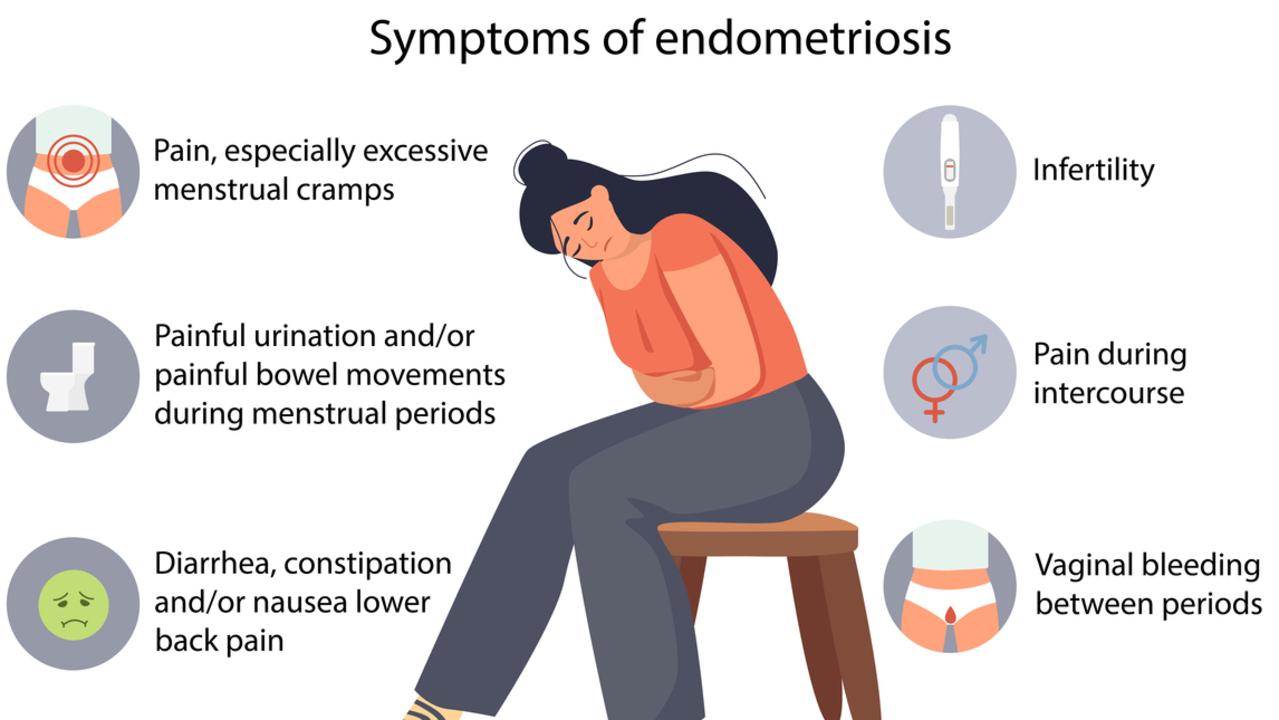‘Dipped in acid’: Woman reveals 10-year battle for diagnosis
A woman who has been struggling with excruciating period pain for a decade opens up about why she is fighting for a diagnosis.
I have been seeking a formal diagnosis for my debilitating period pain for more than 10 years, yet I still don’t have any answers.
Since I first got my period when I was 11 years old, I have shown many symptoms that align with endometriosis – a condition where tissue grows outside of your uterus.
It can often spread to other organs, such as the fallopian tubes, or bowel.
An endometriosis flare up can be extremely painful, and will occur around the start of a period, or for others, all throughout the menstrual cycle.
Most months are the same. I’m curled up, digging my nails into the floor or bed, gritting my teeth.
My lower abdomen is burning, with a pain that alternates between feeling like my uterus had been dipped in acid, or like there was a knife buried deep inside me.
I scream at myself in my head to try and hold on and ride out the pain. Some months, I also vomit or pass out.
A severe flare up will last from anywhere between a couple of hours to two days. Paracetamol and ibuprofen are no help at all. And somehow heat packs make the pain even worse.


Many medical professionals have dismissed my pain. One doctor said I was just stressed. Another told me that I should just fall pregnant if I didn’t want to deal with a period for 9 months. I was a minor when he said this to me.
Many people can wait up to 10 years for a formal endometriosis diagnosis, but this is a generous estimation.
I have heard stories of women being laughed out of hospitals, being denied treatment, and told there is nothing that can be done.
With all their years of experience and qualifications, I don’t understand why so many doctors think it is okay, and it is appropriate to diminish the pain that someone with a uterus is experiencing.
Too many doctors are violating their duty of care and leaving us to suffer.
At the age of 19, after years of going in and out of doctors offices, I was given a pelvic scan referral.
The pelvic scan didn’t show any endometriosis.
The gynaecologist told me that my pain wasn’t worth further exploring. She guessed that I have mild endometriosis but wasn’t sure, and recommended that I go on the pill.
What I didn’t know at the time was that a pelvic scan isn’t the most accurate way of diagnosing endometriosis.

The endo can be too small to be picked up by the scan, and won’t show up.
The most effective way of diagnosing and treating endometriosis is through a laparoscopy – a keyhole surgery to inspect and operate on the organs.
It was Chanelle Otten, the sexologist, who recommended that I get a laparoscopy.
After running her through my symptoms in a session she recommended I get a referral for the surgery.
I met with the surgeon for a consultation and immediately felt uncomfortable.
Within the first few minutes of meeting, he scanned through the referral from the GP, and made an offhand comment about my mental health. I felt sick to my stomach.
He didn’t ask me about my symptoms, he didn’t ask why I was seeking a laparoscopy.
He told me that instead of getting the surgery, I should just go on the pill. I told him that I’ve already tried the pill – my priority was to check if there was any damage done to my organs.
In the end, he told me that he will not be giving me a laparoscopy.
He had the power to give me some of the answers I had been desperately seeking for the past 10+ years, and instead, he took that away from me.
After the appointment, my mum and I walked over to a nearby bench. I rested my head on her lap and began sobbing. I felt like my heart was breaking.

That appointment left me ashamed and humiliated. I was too defeated to seek help again.
But recently that changed. I posted a story to Instagram, detailing my frustration with being denied treatment. I was overwhelmed by the response I received.
Women, from all corners of my life, reached out to offer their support and advice and share their own stories of being neglected by doctors. They told me to keep fighting. Taking up one person’s advice, I booked in a Deep Infiltrating Endometriosis scan.
I am in a position where I can financially afford to keep pushing to see medical professionals, but this is not the standard.
More Coverage
It is unacceptable that seeking medical treatment is a luxury that demands money and time.
Period pain needs to be talked about. We need to demand change.
Women’s health in Australia must finally be taken seriously or countless women will continue to suffer.





